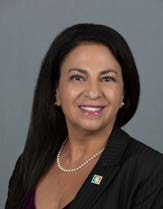CHECK YOURSELF OUT!
Early detection of many health changes can result in better long-termoutcomes when these changes signal illnesses like cancer,heart problems and other issues, many of whichcan be treated.
 by Dr. Corin DeChirico,Chief Medical Officer and Vice President of Medical Affairs
by Dr. Corin DeChirico,Chief Medical Officer and Vice President of Medical Affairs
February is National Self-Check Month, designed to remind us that like keeping an automobile fine-tuned, we have a role in our own health maintenance. Being aware of our bodies helps us know what normal and what changes is might need to be evaluated by a doctor.
Early detection of many health changes can result in better long-term outcomes when these changes signal illnesses like cancer, heart problems and other issues, many of which can be treated.
One of the best ways to know what to look for is awareness of any risk factors or family history that might put you at higher risk for certain health conditions. Knowing your risks will also help your doctor suggest any lifestyle changes that could help lessen these risks.
To get into a routine of self-checks and be able to recognize problems, it is important to begin them when you are feeling healthy, so you can become aware of what is normal for you.
Here are nine basic checks that can help you keep track of yourhealth:
- Take your temperature. It is important to check your temperature when you are feeling good, so you know what is normal for you. Temperatures outside of your normal range often indicate illness.
- Testicular and breast checks are important to discover lumps or swelling that may indicate cancer.
- Check your heart rate. Your resting heart rate in the morning gives you an indication of general wellness and depends on your age and fitness. Checking every morning for a week can help determine your usual rate. A change of 10 beats per minute or more may be worth discussing with your doctor. A persistent rate above 100 beats per minute may indicate a serious health issue.
- Blood pressure. High blood pressure is a major risk for strokes, heart attack, heart failure and kidney disease.
- Many blood and swab tests can be done at home and can indicate cholesterol levels, thyroid issues, urinary tract infections and strep throat. It is important that adverse results be interpreted by a doctor.
- Blood sugar levels can be tested with home blood glucose tests. Blood sugar levels are important because diabetes can lead to complications such as heart, kidney and dental disease, stroke andblindness.
- Waist fat measurements. Too much fat around your waist can increase the risk of cardiovascular disease, insulin resistance and type 2 diabetes. Measure your waist at the level of your belly button. If your waist is 37 inches or more for men and 31.4 inches or more for women, you may be at risk, and should talk to your doctor about weight management.
- Skin cancer is one of the most common forms of cancer you can screen for yourself. Look for new growths or moles that have changed, bleed, itch, burn or crust over. If you are fair skinned, have family history or spend a lot of time in the sun, you may also want to get checked annually by a dermatologist.
- Check your skin, hair and nails, as subtle changes can suggest things happening internally, nutritional imbalances or more serious issues such as a thyroid problem. Excessively dry skin, rough scaly patches or redness could be eczema, psoriasis or rosacea, but they can also offer clues about how your digestion and detox systems are functioning. Your doctor can determine the underlying causes of changes in skin, hair and nails and recommend treatments.
While it is beneficial to keep an eye on your own health, it is also important to have a good relationship with a primary care provider, who will also consider your risk factors and maintain a complete picture of your overall health. While self-checks can help you catch potential health problems early, they are most effective when results are evaluated by a doctor.
About the Author
Dr. Corin DeChirico, Chief Medical Officer and Vice President of Medical Affairs, runs the clinical programs for Healthcare Network after more than 25 years as a healthcare clinician, leader and physician executive.
For information on Healthcare Network, visit healthcareswfl.org or call 239.658.3000.




Leave a Reply
Want to join the discussion?Feel free to contribute!